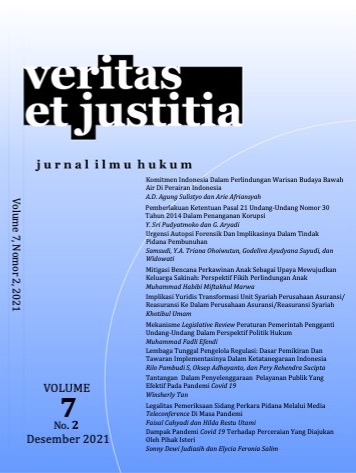DAMPAK PANDEMI COVID-19 TERHADAP PERCERAIAN YANG DIAJUKAN OLEH PIHAK ISTERI DI INDONESIA
Keywords:
Pandemi COVID-19, divorce rate, comparative law approach;Abstract
The protracted pandemic caused by Covid-19 pandemic apparently, as observed in several regions in Indonesia, caused a significant increase in number of divorces initiated by women. In this paper, the author seeks to analyse this socio-legal phenomenon in comparison to similar situation occuring in other countries. Using a juridical-sociological and comparative law approach, the author seeks to identify what factors determines the decision to file a divorce and to what extent the Pandemi, significantly impacting macro economic as well as family economics influence the existing divorce rate.
References
Buku:
Adinda Permatasari, Kedudukan Seimbang Suami Isteri Dalam Perkawinan Menurut Hukum Islam dan Hukum Perkawinan Nasional Dalam Kasus Vasektomi, Universitas Indonesia, 2006
Dedi Susanto, Kupas Tuntas Masalah Harta Gono Gini, Pustaka Yudisia,Yogyakarta, 2011
Hilman Hadikusuma, Hukum Perkawinan Indonesia Menurut Perundang- undangan, Hukum Adat dan Hukum Agama, Mandar Maju, Bandung, 2018
Libertus Jehani, Perkawinan, Apa Resiko Hukumnya?, Forum Sahabat, Jakarta, 2008
Moh. Zahid, 25 Tahun Pelaksanaan Undang-Undang Perkawinan, Departemen Agama Republik Indonesia, Jakarta, 2002
VeJ Volume 7 • Nomor 2 • 526
Retnowulan Sutantio, Wanita dan Hukum, Alumni, Bandung, 1979
Rusdi Malik, Memahami Undang-Undang Perkawinan, Universitas Trisakti, 2009 Soerjono Soekanto, Pengantar Penelitian Hukum Cetakan 3, UI Press, Jakarta, 2010 Sonny Dewi Judiasih, Betty Rubiati , Deviana Yuanitasari, Hazar Kusumayanti, &
Elycia Feronia Salim, Sustainable Development Goals: Upaya Penghapusan
Perkawinan Bawah Umur di Indonesia, Cakra, Bandung, 2019
Sonny Dewi Judiasih, dkk, Perkawinan Bawah Umur di Indonesia, PT, Refika
Aditama, Bandung 2018
Sonny Dewi Judiasih, Harta Benda Perkawinan: Kajian terhadap Kesetaraan Hak
dan Kedudukan Suami dan Isteri atas Kepemilikan Harta dalam
Perkawinan, Refika Aditama, Bandung, 2019
Suharsimi Arikunto, Prosedur Penelitian Suatu Pendekatan Praktek, Rineka Cipta,
Jakarta, 2002
Jurnal/Sumber Lain :
Alan J Hawkins, William Doherty, Brian J Willoughby, Reason for Divorce and Openness to Marial Consiliation, Journal of Divorce and Remarriage,Vol53 Issue 6, 2012
Alexandra Killewald, Money, Work, and Marital Stability: Assessing Change in the Gendered Determinants of Divorce, American Sociological Review Vol 81 No 4, 2016
Anna Odrowaz-Coates, Is Gender Neutrality A Post Human Phenomenon? The Concept of ‘Gender Neutral’ in Swedish Education, Journal Of Gender and Power, Volume 3 Number 1, 2015
Aris Tristanto, Perceraian di Masa Pandemi Covid-19 Dalam Perspektif Ilmu Sosial, Sosio Informa, Volume 6 Nomor 3, 2020
Basem Abbas Al Ubaidi, The Psychological and Emotional Stages of Divorce, Journal of Family Medicine and Disease Prevention, Vol 3 Issue 3,2017
Chea Sarah, 2020 “Covid-19 sees Marriage, Birth Falls as Divorce, Death Rises”, https://koreajoongangdaily,joins,com/2020/09/23/business/economy/ne wlyweds-marriage-population-decline/20200923192300411,html, Diakses 19 Oktober 2020
Karyn Loscocco dan Susan Walzer, Gender and the Culture of Hetereosexual Marriage in the United States, Journal of Family Theory and Review, Vol 5, 2013
Nurhasanah, The Analysis of Divorce by Wife, The International Journal of Counceling and Education,Vol 2 No 4, 2017
Plataforma, 2020, “Divorce increased During The Pandemic in Brazil 70 of Request Made by Women”,
https://www,plataformamedia,com/en/2020/06/20/divorces-increased- during-the-pandemic-in-brazil-70-of-requests-made-by-women/?lang=en, diakses 19 Oktober 2020
Pooja Rathi and JP Pachauri, Problems Faced by Divorced Women in Their Pre and Post Divorce Period : A Sociological Study With Reference to District Meerut, Journal of Pharmacognosy and Phytochemistry ,Vol 7 Issue 1, 2018
VeJ Volume 7 • Nomor 2 • 527
Rustam Dahar Karnadi Apollo Harahap, Kesetaraan Laki-Laki dan Perempuan Dalam Hukum Perkawinan Islam, Vol 8 No 2, SAWWA, 2013
SEMA Nomor 2 Tahun 2019 Tentang Pemberlakuan Rumusan Hasil Rapat Pleno Kamar Mahkamah Agung Tahun 2019 Sebagai Pedoman Pelaksanaan Tugas Bagi Pengadilan
Semanur Kodan Centinkaya and Basaran Gencdogan, The Relationship Between Marital Quality, Attitudes Towards Gender Roles and Life Satisfaction Among The Married Individual, Psychology, Society, & Education ,Vol 6 No 2, , 2014
Sonny D Judiasih, Betty Rubiati, Deviana Yuanitasari, Elycia F, Salim, Levana Safira,
Efforts to Eradicate Child Marriage Practices in Indonesia : Towards Sustainable Development Goals, Journal of International Women’s Studies, Vol 21 Issue 6, 2020
Suki Chung, 2020, The Rise of Corona Divorce Amid Japan’s Domestic Violence Shadow Pandemic, https://www,amnesty,org/en/latest/news/2020/08/the-rise-of-corona- divorce-amid-japans-domestic-violence-shadow-pandemic/, diakses 20 Oktober 2020
Ubong E. Eyo, Divorce : Causes and Effects on Children, Asian Journal of Humanities and Social Studies,Vol 06 Issue 05, 2018
Zahra Zandiyeh dan Hojatollah Yousefi, Woman’s Experiences of Applying for a Divorce, Iranian Journal of Nursing and Midwifery Research, Vol 19 No 2, 2014
Peraturan Perundang-Undangan:
Undang-Undang Nomor 16 Tahun 2019 Tentang Perubahan Atas Undang-Undang Nomor 1 Tahun 1974 Tentang Perkawinan
Undang-Undang Nomor 7 Tahun 1989 Tentang Peradilan Agama juncto Undang- Undang Nomor 30 Tahun 2006
Undang-Undang Nomor 39 Tahun 1999 Tentang Hak Asasi Manusia
Peraturan Pemerintah Nomor 9 Tahun 1975 Tentang Pelaksanaan Undang-
Undang Nomor 1 Tahun 1974 Tentang Perkawinan
Instruksi Presiden Nomor 1 Tahun 1991 Tentang Kompilasi Hukum Islam
Downloads
Published
Issue
Section
License
Copyright (c) 2021 Veritas et Justitia

This work is licensed under a Creative Commons Attribution-NonCommercial 4.0 International License.
Authors who publish with this journal agree to the following terms:
Authors retain copyright and grant the journal right of first publication with the work simultaneously licensed under a Creative Commons Attribution License that allows others to share the work with an acknowledgement of the work's authorship and initial publication in this journal.
Authors are able to enter into separate, additional contractual arrangements for the non-exclusive distribution of the journal's published version of the work (e.g., post it to an institutional repository or publish it in a book), with an acknowledgement of its initial publication in this journal.
Authors are permitted and encouraged to post their work online (e.g., in institutional repositories or on their website) prior to and during the submission process, as it can lead to productive exchanges, as well as earlier and greater citation of published work.
The Journal allow the author(s) to hold the copyright and to retian publishing rights without restrictions.






